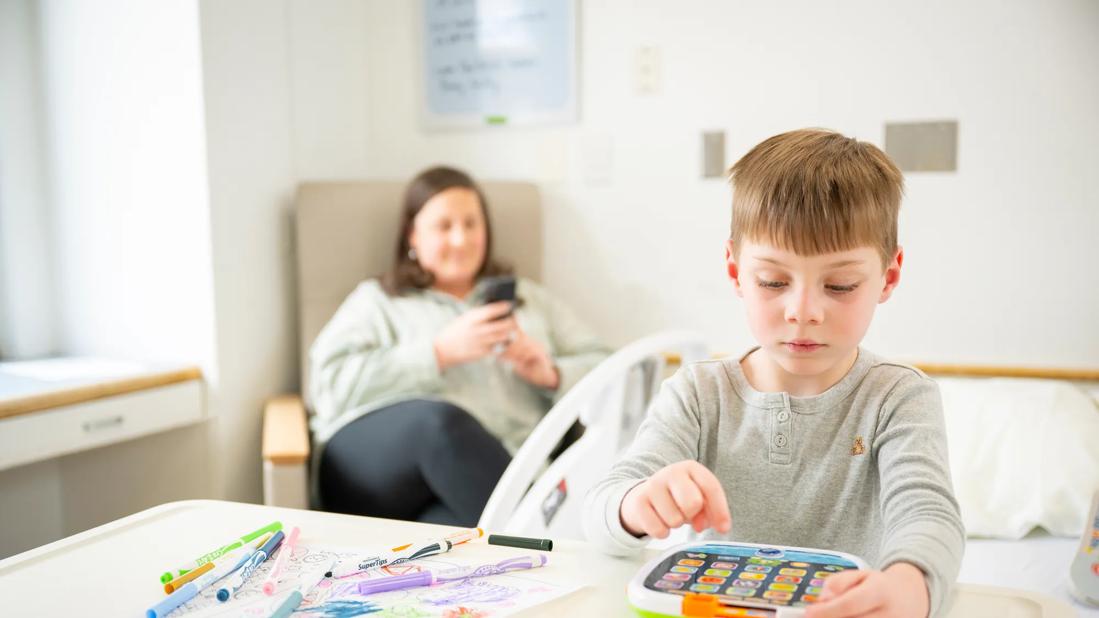Overestimation of pain can escalate treatment, but underestimation can have other unintended consequences

Image content: This image is available to view online.
View image online (https://assets.clevelandclinic.org/transform/d817ebca-85fb-4cbb-a1c5-19497b53d1cc/CHP_5778608_03-19-25_035_MK)
Hospitalized child
A study led by a Cleveland Clinic advanced practice provider reveals that parents of hospitalized children tend to overestimate their child’s highest pain level and significantly overestimate their child’s lowest pain level. Importantly, the researchers learned that children frequently used alternative approaches to pain management, including distraction, more than their parents realized.
Advertisement
Cleveland Clinic is a non-profit academic medical center. Advertising on our site helps support our mission. We do not endorse non-Cleveland Clinic products or services. Policy
“Many parents weren’t aware their children were using distraction techniques,” explains Jane Hartman, MSN, APRN, CPNP, longtime pediatric nurse practitioner at Cleveland Clinic Children’s and principal investigator on the study. “Furthermore, although pet and music therapy are commonly used to comfort hospitalized children, we found that providers and clinicians did not encourage children to use distraction and other nonpharmacologic alternatives to pain medication with each encounter.
When managing pediatric patients, providers should be encouraging nonpharmacologic treatments for pain control 100% of the time, so it’s clear that we have work to do in that realm.”
Research findings have important implications for clinicians. For example, clinicians may get more reliable information by speaking directly with children about their pain rather than reflexively turning to parents, says Hartman. She adds that failing to involve children in discussions about their pain may lead to improper pain management and may have unintended consequences of long-term mistrust of the healthcare system and caregivers. In addition, relying on the parents’ assessment alone may result in children receiving higher or lower doses of pain medication than necessary, she notes.
“As a pediatric nurse, I know it can be tempting to ask parents for information even when their children are reliable and can participate in conversations about how they feel,” Hartman says. “We understand that parents, especially mothers, want to be involved in their children’s care, but our findings indicate that we may not be giving children enough credit.”
Advertisement
Hartman emphasizes that children should be involved in planning how their own pain is treated. “Pain management should be individualized, but children’s opinions matter,” she adds. “More research is needed to understand if prioritizing how children view their own pain — rather than how their parents view it — will lead to a higher level of physical activity or engagement in the hospital environment.”
The study findings were presented at Cleveland Clinic’s 2024 Nursing Research Symposia. To learn about both parents’ and children’s perceptions of a child’s pain, parent-child dyads were surveyed simultaneously but separately. Children with moderate to severe developmental delays were excluded.
Hartman recommends that providers speak to the pediatric patient first —before consulting with other family members — because children may be reluctant to contradict their parents. “When you talk with children directly, they will talk directly back to you,” she says. “But if you bypass them, they will let it happen and defer to the adults in the room. That’s why it’s so important for us to include them in the conversation.”
“It’s important to get this right because our patients’ trust in us as caregivers is at stake,” she says. “By really listening to children, we demonstrate our respect for their well-being and autonomy.”
Advertisement
Advertisement
Regional organizations collaborate to address nurse faculty shortage
How wellness habits help nurses flourish
Planning continues with critical, patient-focused input from nursing teams
Strengthening care through targeted resources and frontline voices
Embracing generational differences to create strong nursing teams
CRNA careers offer challenge and reward
An unexpected health scare provides a potent reminder of what patients need most from their caregivers
Cleveland Clinic Abu Dhabi initiative reduces ICU admissions and strengthens caregiver collaboration